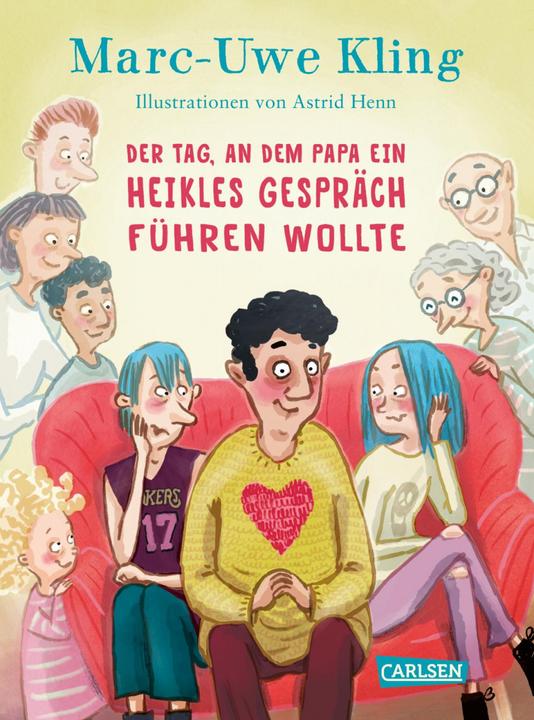

Help, what do I tell my kid? How present-day sex ed works
Love, sex, genitalia – so many questions! And parents left struggling for answers. When and how should you go about talking about sex with your children and what role does social media play? We asked an expert.
Sex ed is a bit like having children. There’s never a perfect time for it. Although I knew my daughter would eventually ask the first few questions about sex, I wasn’t prepared when that time came. Maybe because it feels like she was only just a baby (and will always be for me as a mother). And then, all of a sudden, she’s wanting to know all these existential things: how she ended up in my belly. How she made it out. And why she doesn’t have a penis.
Vera Studach knows why sexual education can overwhelm and throw parents off guard. She’s a specialist for sexual health in education and counselling SGCH and head of the sexual education centre «liebesexundsoweiter» in Winterthur. In this capacity, she regularly talks to school kids and conducts parent evenings about sex education.
Vera Staudach, my six-year-old daughter is bombarding me with her first questions about sexuality. I feel overwhelmed, as I wasn’t expecting it just yet.
Vera Studach: It sounds like you were surprised and caught off guard. Think of it as an opportunity and a sign of trust that your daughter is asking you about these things. Try to answer her questions as directly and clearly as possible; just like you would with any other question that’s on your daughter’s mind. Providing answers to these questions early on builds trust. At some stage, your daughter will reach an age when she might be embarrassed to speak to you about it. But that’s normal, too. Peers will then be her first port of call.
But she’s only just turned six. Isn’t that too early?
No, it’s totally normal at that age. And besides, it’s never too early to start sex ed, provided your child is initiating it. First questions about bodies are usually posed by children between three and six. Even at this stage, it’s important to express yourself in understandable terms.
Why is it hard to find the right answer to simple questions such as «Mum, why do you have hair down there?», for example?
Parents tend to struggle because they never learned to speak about sex-related things.
I got my daughter some age-appropriate sex education books and am surprised at how detailed the information about sex, fertilisation and genitals is.
I also remember being astonished when I experienced this with my own children. Some books really go into a lot of anatomical detail. You can always skip those bits as you see fit.



Der Tag, an dem Papa ein heikles Gespräch führen wollte
German, Marc-Uwe Kling, Astrid Henn, 2021
Do you think some books contain too much information?
I think it’s a good thing that lots of information is being offered. Children filter the information and pick out what they want to know. Or they’ll ask you if they want to learn more. Make sure to use the correct terms for genitalia from the start. Vulva, for example, when you’re speaking about the outer part of the female genitals.
No birds and bees then?
By talking about the birds and the bees, you’re deliberately telling your child white lies you’ll have to correct later on. This strategy doesn’t make sense and isn’t taking the child’s needs seriously.
And yet, children discover sexuality through play. What’s up with playing doctors and nurses?
They’re exploring their bodies together while playing. This is fine if the kids are the same age. And also a good time to take up sex ed. As a parent, be sure to address the rules of playing doctors and nurses. These include playing it with children who are roughly the same age and in a room that is open. Also mention that nothing should be put into body orifices. What’s more, every child should have the right to say no at any time and this needs to be respected. This is a very important aspect of sex education: teaching your child to stand up for themselves and to defend themselves.
What else should I keep in mind for a successful talk about sex?
More often than not, the emotional aspect doesn’t get enough attention. Remember to always include feelings. Especially when it comes to preventing sexual abuse. Talk about what feels nice. And discuss what happens if that feeling isn’t nice. What’s equally important for parents to do is to create an environment in which there’s a place for sexuality.
How is this achieved?
Display your affection for your partner. Don’t hide tenderness and kisses from your kids. But also make a point of having intimate zones that you won’t share with them. Despite or even because of the everyday stress we’re under, affection shouldn’t take a backseat. As parents, you’re role models your kids are watching.
Smartphones and social media mean children today are exposed to sexual content early on. It seems they know all there is to know from a certain age. Is this a fallacy?
These platforms pretend to encompass everything there is to know about sex, but they’re actually providing children with a one-sided and distorted image. This is precisely why sex education is so important, because it corrects and complements this picture. Besides, just because children see things doesn’t mean they can contextualise them. As soon as parents give their children access to new media, they need to give them guidance as they consume the available content.
Has social media changed sex ed?
Yes, completely. Back in the day, you’d give your children a sex ed book and maybe provide them with a bit of additional information at most. Today, the main task for us as adults is to help children navigate the information overload. After all, not everything’s negative on social media. There are many influencers on Tiktok, YouTube or Instagram who definitely share important and valuable content. About body positivity or trans identity, for example. Kids feel understood and can relate. What’s tricky is to root out the valuable content from the abundance that’s out there.

Source: liebesexundsoweiter
Speaking of abundance: has the range of topics in sex education increased in recent years?
Absolutely. Trans identity, sexting, LGBTQI... sex ed covers a huge spectrum. One thing’s for sure, kids are still just as curious as they were 20 years ago. Nothing’s changed there.
What about kids who don’t ask questions? What if my daughter hadn’t come to me?
You should never push it. The traditional option is to «accidentally» leave a sex education book lying around in the living room every now and then. Until your child develops a curiosity for the subject.
So I should seize the opportunity and have a conversation with my child?
Yes and no. There’s no such thing as that one talk about sex. It will take more than a single chat. It’s a process. Parents should always take opportunities, for example, when they’re watching TV together and the subject comes up. Or in a political context, like in the run-up to last year’s vote on marriage for all.
When should parents actively start talking about sex? When is it too late?
If you think of sex education as a holistic matter, sex education starts at birth. When you’re washing your baby’s genitals, for example, it’s important to use the right words. By doing so, the child will have a language for sexuality. From around the age of two or three, many children start asking questions about their own and other people’s bodies. It’s important and appropriate to then answer the questions as accurately as possible. Don’t rely on schools to do this. This only happens quite late, around fifth grade. Considering that kids today are starting puberty earlier than they did a few years ago, it’s too late.
My daughter will be starting school this summer. What should we start talking about at home until sex education at school kicks in?
As a parent, you can prepare children as young as six to eight years old for menstruation and ejaculation. Talk about different types of relationships and families, and provide them with more details about the reproductive cycle. Also discuss friendships, being in love and how to treat each other. Explain the differences between cuddles and sexual caresses and mention that a man can be in love with a man and a woman can be in love with a woman. From around nine years of age, it’s important to educate your child about the physical changes that happen during puberty. As parents, you should also repeatedly mention that everyone is valuable, regardless of their gender, sexual identity and preferences.
Mom of Anna and Elsa, aperitif expert, group fitness fanatic, aspiring dancer and gossip lover. Often a multitasker and a person who wants it all, sometimes a chocolate chef and queen of the couch.


